- How to Do SEO for Affiliate Marketing in 6 Steps (In 6 Months) - October 19, 2024
- Ecommerce SEO: The Ultimate Guide - October 19, 2024
- How to Grow Your Ecommerce Business Exponentially: 11 Growth Hacks - October 19, 2024
SEO stands for search engine optimization — the art of gratifying Google so that your website comes up #1 in the Google search engine results page (SERP).
Every day, I get emails from entrepreneurs, agencies, and other bloggers asking me, “Mark, how can I improve my SEO?” But before giving them an answer, I first ask them to explain their business to me.
Why? Because SEO isn’t a good strategy for every business! Some businesses are perfect candidates for SEO and others just aren’t.
Why spend your valuable time on a strategy that won’t work, right?
So anyone who tells you to “do more SEO” without taking the time to understand your business doesn’t know what he/she is talking about.
I can tell you all this from experience.
I ran marketing at a startup called PlushCare that went from zero organic traffic to almost 1 million organic visitors/month… in under a year.
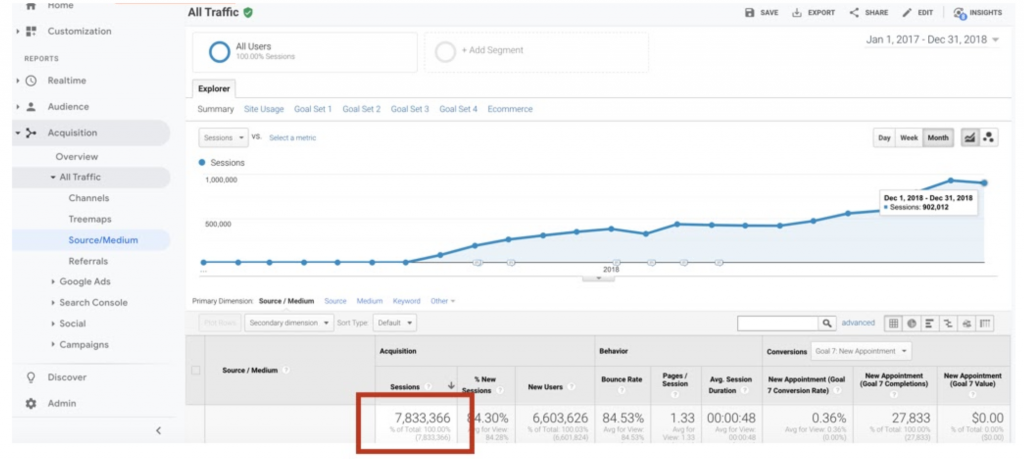
Meanwhile, on the side for a few hours a week, I grew Growth Marketing Pro to over 40,000 organic visitors/month.
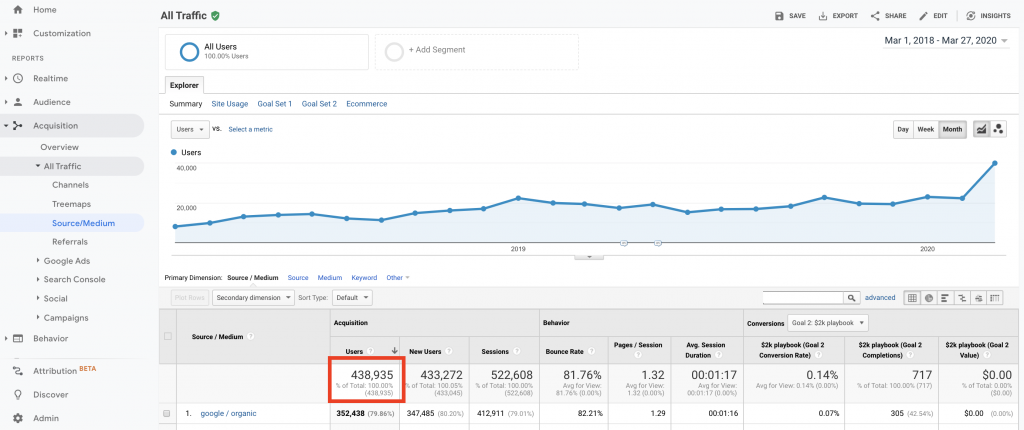
And this past year, just to prove I could do it, I started ManlyWellness and grew it to 107,345 monthly organic visitors in 6 months!
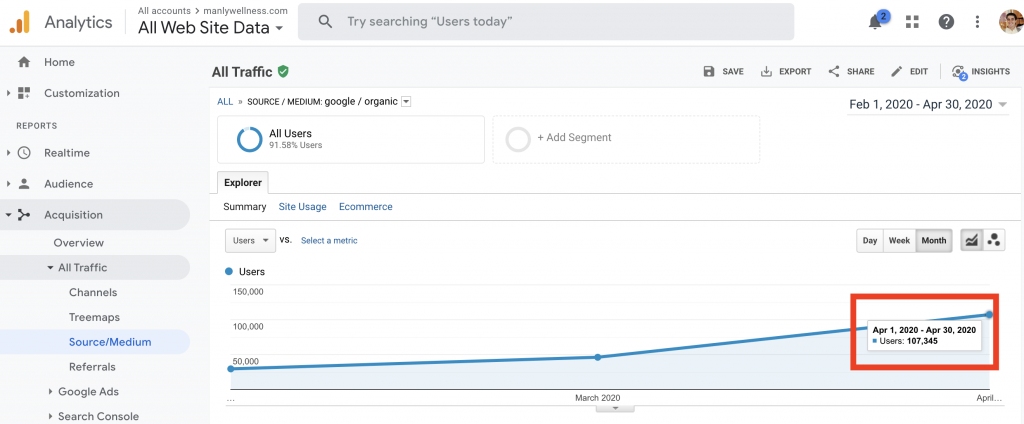
I know what I’m talking about. And I promise this: SEO isn’t rocket science.
There are easy shortcuts and SEO best practices that make it totally possible for someone with no experience to absolutely crush it.
But first, you need to decide whether it’s even a viable strategy for your business. That’s what this post is about.
Table of Contents
How do search engines work?
Big search engines are the everyman’s portal to the internet. If you need restaurant reviews, how-to guides, song lyrics, news, a job or even underwear, you might start your search with Google.
This makes it very valuable to be the first result for common queries or queries relevant to your industry.

Search engines like Google “know” what to display first in the search results by scanning their massive index of webpages for those that are most relevant to the searcher’s query.
How does Google decide which query is most relevant?
In order to rank information, Google uses web crawlers, which meticulously “crawl” from page-to-page around the internet. Web crawlers are programs that catalog the internet. Google’s web crawler is aptly named GoogleBot.
Web crawlers follow the URL trail — bouncing from site to site via websites’ internal and external links. In this way, the crawlers build up a repository of information. They make a digital trail map of the internet.
A little more about SEO and page rankings
Google has to prioritize websites somehow. Googlers are much happier with an ordered list of the most relevant search results than with an unorganized list of 100,000 search results.
When I search for “Drake Gifs,” I want the most relevant and funny ones to appear first.

Google’s algorithm, PageRank is used to determine “authority” of crawled pages and then rank those pages accordingly in the SERP.
So if you can figure out how to convince Google that your website is the most authoritative on a topic, you will get a lot of free traffic from Google searchers who “organically” land on your website.
Even though Google is a very big and transparent company, the specifics of its PageRank algorithm are purposefully kept hidden. Google doesn’t want savvy marketers like us trying to trick the algorithm — rather, it wants search results to be a real interpretation of a webpage’s relevance, importance, readability, robustness and popularity.
There are a few factors that will always influence page rank, including:
- Great, engaging content.
- Internal links: links between relevant pages on your site.
- Backlinks from other credible websites.
- Careful keyword selection: you can’t rank for everything!
- Website speed: Google doesn’t like sites that lag too much.
- Mobile-readiness: simply, is your site readable on mobile?
But Google’s “secret sauce” is ever-changing.

Will SEO work for my company?
This is an important question that so many people fail to ask!
Just because SEO exists doesn’t mean you should be using it for your website or business! There are tons of marketing tactics out there. SEO is just one of them.
You could try:
- Facebook Ads
- Google Ads
- Affiliate marketing
- Referral programs
- Email marketing
- Webinar marketing
- And really, any other lead generation strategy
Some businesses lend themselves very well to SEO, and others don’t — even with a lot of great, consistent effort from marketers.
High search, low competition
To explain: all things equal, SEO works much better for businesses or products with high search volume (or at least, moderate search volume).
For instance: nobody is searching for “hats for my pet lizard.” So even if you have an incredible article about that topic, no one will ever land on it organically via Google search.
Some keywords are highly searched, but may also be highly competitive. You want to pick keywords with low competition. It would be stupid to try and rank above Amazon and Walmart for search keywords like “white t shirt.”
It would be much easier to rank for “blue men’s tie dye t shirt.” But of course, the search volume for that keyword is lower. It’s a balance of choosing keywords with decent enough search volume and not too much competition.
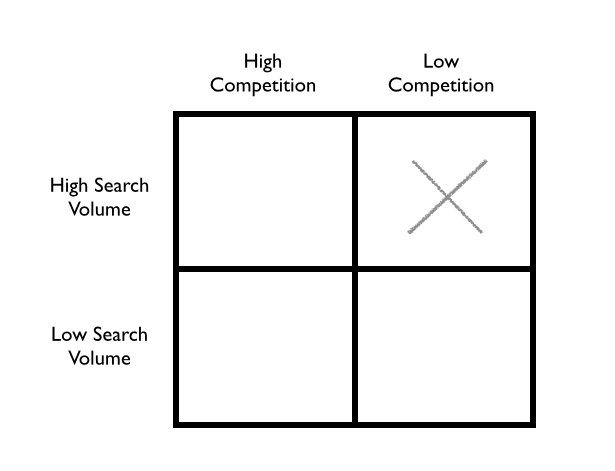
Pockets of SEO arbitrage exist all over the internet.
For example, in 2007, when personal finance app, Mint.com was trying to get off the ground, search terms like, “which credit card is best for travel points?” were highly searched and not very competitive.
Before launching, Mint took advantage of those keywords and built an email list of 30,000 people in less than a year… completely with organic search traffic. A few years later, Mint sold for about $170 million to Intuit.
Mint found an untapped SEO goldmine — a “high search volume”/”low competition” category.
It’s the same sort of opportunity that Expedia found in the hotel/travel space and The Motley Fool found in the personal finance space. It’s hard to believe, but at one time, no credible website ranked for “why is Apple’s stock price up today?”
How can I determine if my business is high search, low competition?
- Some of this stuff is just logic. If you’re selling Michael Jordan memorabilia, I’d be willing to bet you have a million competitors and it’s going to be difficult to dethrone them all.
- Another way to gauge competitiveness is with a Google search in your Chrome browser. Open a new incognito window and simply search for the keyword you care about. See what the quality of the search results look like for queries your customer might be searching for. If the top 10 results reveal primarily NY Times articles, huge blogs, .gov and .edu websites, big industry publications and other really dense competition, it might be worth abandoning an SEO strategy for now.
- Use an SEO tool. Growth Marketing Pro’s SEO tool, GrowthBar, has a competitiveness feature built right into it, so you can understand how difficult it will be to rank for a certain keyword.
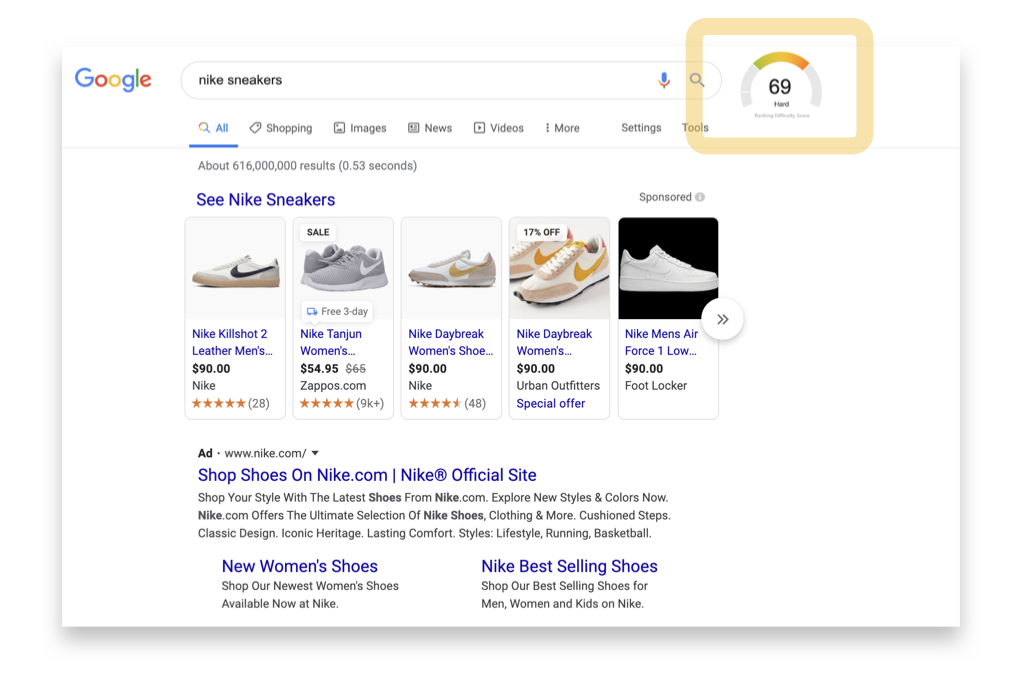
How to determine if there is search volume for your desired keyword:
To figure out if your keyword is highly searched you need to do some more sophisticated sleuthing. You can either use your best judgement or you need an SEO tool. Again, that’s why we built GrowthBar. It enables you to see how much search volume there is for any query. Any keyword with over ~300 monthly Google searches is popular enough to generate meaningful revenue online.
Like I said, this is so important, we built it into our SEO tool, GrowthBar.
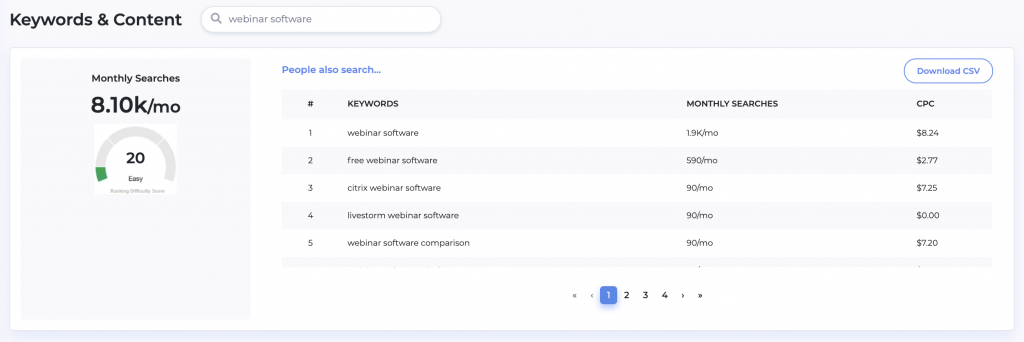
But remember: search for a bunch of “long tail” terms as well. Sure, you might never rank #1 for “car auctions” but you might be able to rank #1 for “car auctions in California.” And you may have even better luck with “car auctions in northern California.”
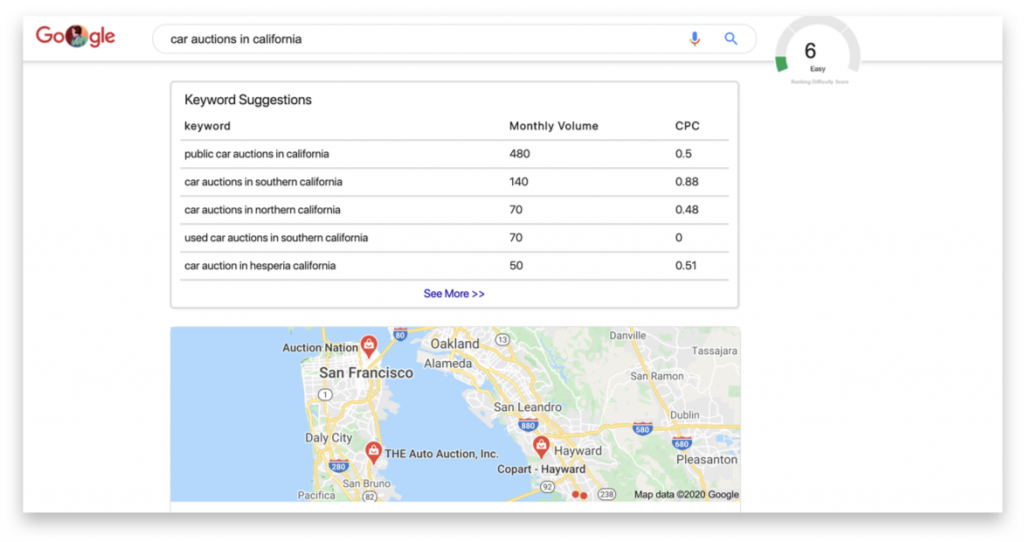
We built GrowthBar for entrepreneurs and marketers who want the most straightforward, results driven, and affordable SEO tool.
Try GrowthBar free…
Which types of business are “high search, low competitiveness?”
Hailey and I always take great care when deciding whether to begin writing about a topic or not. We don’t write about everything — just topics that are at the intersection of what we know real well and what our customers are searching for.
One of our personal areas of expertise is webinar software.
We know that marketers and founders are often trying to learn about how to host webinars and how to choose the right hosting tools. Before deciding whether to write or not, we look at Google’s Keyword Tool or GrowthBar.
“Webinar software” and other permutations of the phrase see about ~10,000 searches per month and very light competition.
We decided to begin writing about webinar software and lo and behold, we rank in the top 3 for the term organically nearly all the time.
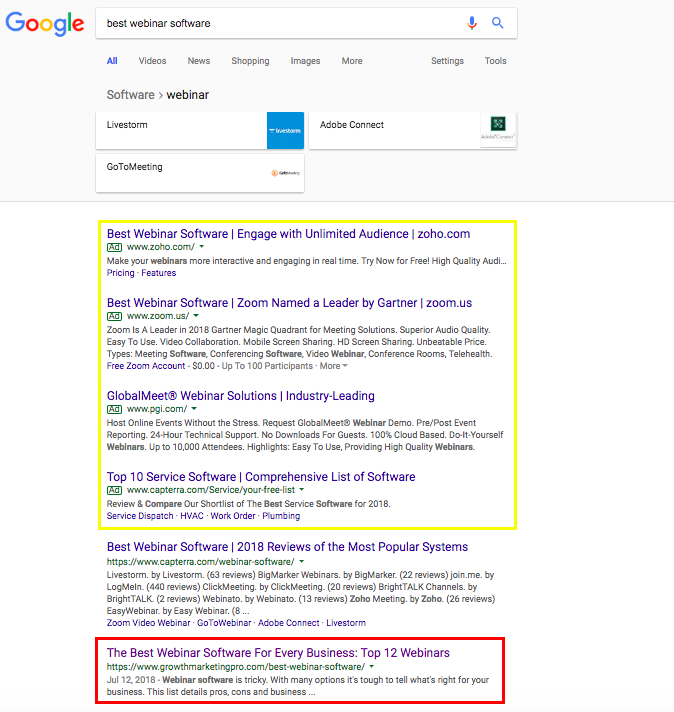
There are a some verticals that I’ve frequently found have some SEO opportunity:
- Businesses with a ton of SKUs: if you have an ecommerce store with hundreds of SKUs, each one is an opportunity to rank for something new. You will naturally have a lot of content, just by having so many product pages.
- Businesses with local search intent: it’s much easier to rank for “computer repair in san francisco” than “computer repair.” Learn more about local SEO here.
- Businesses that are emerging in search popularity: take for instance, industries just entering the online space — service businesses, urgent care/doctor offices, pet care and a lot more.
- Industries with tons of search volume: there are some spaces, like personal finance, credit cards, airline travel, health and wellness and hotels that have been online for a while — it wouldn’t seem there is room for new entrants. But every year there are new companies making an SEO splash in these spaces.
7 SEO tips for the modern marketer
If you do decide to go the SEO route, there’s a few things you can take to the bank. Follow these seven tips.
Or read: 12 SEO Best Practices
1. Content marketing
Content marketing is still the best way to curry favor with Google. Strong and relevant, written and video content will continue to be rewarded.
If you want to learn how to make awesome content and get tons of traffic, sign up for my email series:
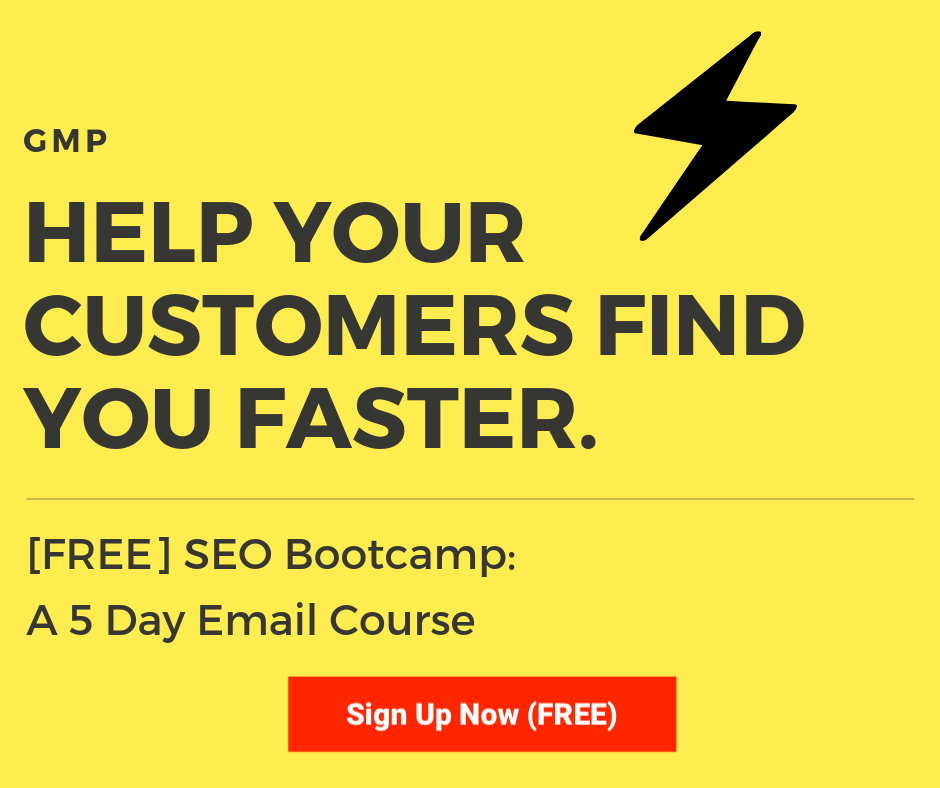
Websites with some of the highest Google ranks in the world like Nerdwallet, NY Times and Amazon are huge content machines – each publishes thousands of words of content and many pictures/videos every hour.
The more content you have, the more opportunity you have to rank for some of the billions of Google searches that happen every day.
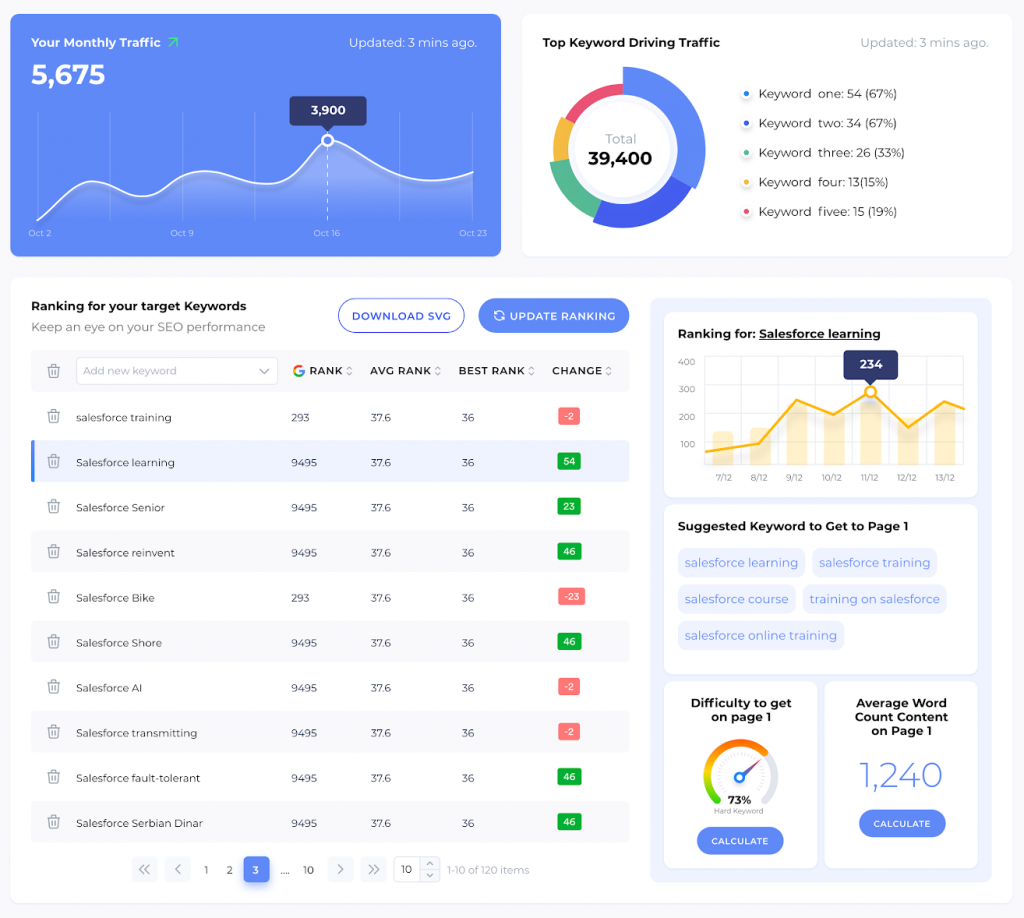
2. Mobile
Google is beginning mobile-first indexing. This means that websites which are mobile-responsive and formatted correctly on mobile phones will be rewarded with better search rankings. More, structured markup on websites must be proper for both desktop and mobile.

Hint 1: use short paragraphs (like I’m doing in this post) whenever possible. Visitors reading posts on mobile devices will be much more engaged than they will be sifting through very dense, long paragraphs.
Hint 2: if you don’t do anything else, just take a look at your site on a phone and make sure it all makes sense and nothing is wildly out of place or cut off.
3. AMP
AMP stands for accelerated mobile pages. It is one way that Google’s mobile-first approach is changing how marketers and developers do search engine optimization.
After Google announced AMP in 2015, 37% of news sites had AMP versions. AMP’s purpose is to improve the load time and functionality of mobile sites.
Also, AMP allows developers to build websites for desktop and mobile in one fell swoop, reducing time spent optimizing code for different platforms. Unless you understand HTML, the differences in the code may not mean much – they are not terribly complex, but they are very impactful.
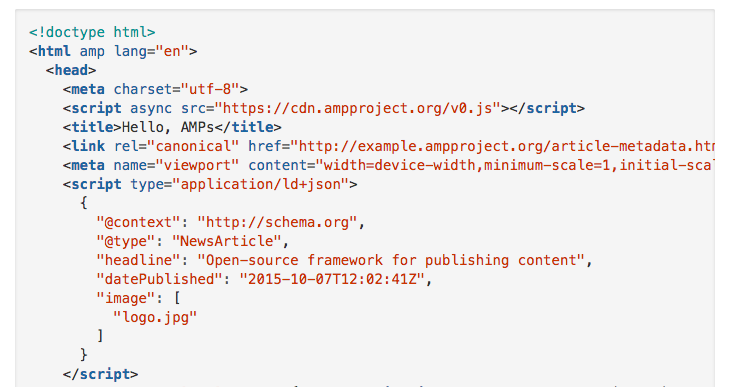
While AMP is pretty cool for advanced SEOs, it’s definitely not necessary for most marketers. In fact, some people believe Google is phasing it out slowly but surely.
4. Google Plus
I include this one, only to make clear that Google+ is dead. It’s sad, but true. The network didn’t catch on like they had hoped. For a while, many SEO experts swore that G+ would be an important factor in search ranking, that is definitely not the case.
Fossils of G+ still remain in Google search results, don’t bother spending any of your time on this social network.
However, social media does play a role in SEO.
While Google says social media signals don’t matter for their rankings, platforms like Facebook, Twitter, LinkedIn and Instagram really do matter. To explain:
- Social media sites’ content gets indexed by Google. If you Google search “Channing Tatum” (I never have), his Facebook and Instagram accounts are among the first results. So while it may not help your organic rankings, the more content you have in Google’s search engine, the more it will be seen by Googlers.
- Social media does something else incredibly important: it gets people to Google you or your website. Google cares how many people are Googling your business. It’s a trust signal that says to their algorithm, “hm, this business must be relatively important.” So if you have 10 million Instagram followers and you spin up a website tomorrow, you’d rank very quickly.
5. Local Search
In a mobile-first world, local search is very relevant. The Google Possum Update and all the tests we see in local, indicate that local is going to continue to be important in search results.
When you search “san francisco burgers,” Google wants to ensure your results are local and rich in content.
Make sure to have a presence on Google and Yelp listings, as they’re generally the first results that show up for local searches. You can increase your trust signals (thus, your rankings) by including exact contact information on your site and by following some other local SEO best practices.
6. Tools
Marketing tools can be super important in making great SEO decisions. There are some great ones, like Yoast, which is a WordPress plugin, gives you tips on how to optimize your site for SEO. Most website builders have app stores that contain tools for search optimization.
I recommend reading our list of The Best SEO Tools to pick the one that’s right for you.
And of course, I have to plug GrowthBar…
7. The Normal Stuff
Today, SEO is still about the same stuff it’s always been about…the stuff you’ve probably heard about. Do the following:
- Make relevant titles: your webpage titles should speak to your focus keyword — it should answer the Google searcher’s question
- Create orderly content — it should be organized and structured with h1’s, h2’s text, etc.
- Keep people on your website: Google knows if people are hanging on your page for a while or bouncing right off. If you write compelling content you will keep visitors for longer. Uses short, precise sentences and line breaks to make it an easy read.
- Link to other reputable sources.
- Link to other pages within your website.
- And get backlinks to your content! This one is super important and deserves its own post: The 25 Best Backlinking Strategies for SEO.
Closing thoughts on SEO
SEO, like all of marketing, is about prioritization.
You can acquire customers with Facebook, LinkedIn, Taboola, press, events and a million other marketing channels.
Is SEO worth your time? If done correctly, it can be a wildly scaleable and affordable means of getting customers.
So, will it work for your business? That’s a question you should be able to answer after reading this post. Sign up for my email series if you want to read more.

Also read:
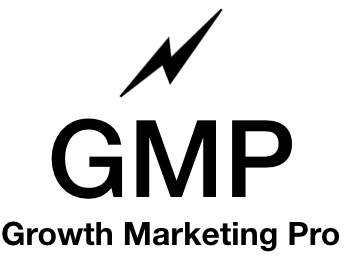


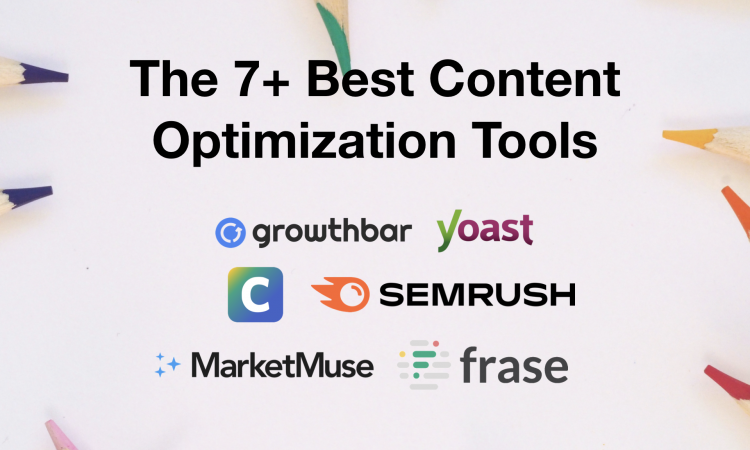

Any beginner-friendly SEO tools you can recommend? I’m a solo founder and very willing to do SEO work to get my site up there in the ranks.
You can try Ranking Coach. A great SEO blog for WordPress is https://onlinemediamasters.com/
SEMRush and Google’s Keyword Tool are both great. And once you get some great organic traffic, don’t forget to use a tool like HelloBar to create calls-to-action and/or capture leads and convert them into users.
Google itself has very useful tools for SEO. The most obvious is using Google itself and then looking at the related searches and also the sites that it’s rewarding. Every keyword has different intent so searching and looking at the results will tell you what type if content you need to create.
Google search console is great for figuring out whether your pages are being indexed and the keywords your pages are getting impressions for.
Google analytics can tell you how users are behaving on your website. Are they bouncing right away or finding value? Etc etc
@markspera at what stage of a company’s growth cycle would you recommend spending time and $$ on SEO – especially if you’re in a space where there is a lot of competition for keywords?
Hey @zari, as someone who has helped startups with SEO, here are a few thoughts that might help answer your question:
1. SEO takes time. Newer businesses who need to grow FAST and don’t have time to be patient would be better off putting time and money into something else. But if you aren’t under the gun at the moment, SEO has a lower cost and greater ROI than many ads. And if you have plenty of time, that is true even in highly competitive fields.
2. Many other forms of marketing are also good for your SEO. Keyword planning for Google Ads and creating landing pages will also probably benefit your SEO to some extent. So look at ways to combine marketing methods to get the most bang for your buck.
In general, I agree with @James. If you’re in a competitive keyword space, it’s best not to start with SEO. But, if you have a long cash runway, it’s never too early to start taking on some of the bigger guys. As a founder, you’re an expert. If you can create better content than the competitors you can outrank them on Google.
Hi Zari
Great question. I think it’s not the stage, but rather the 1) SEO opportunity (is there one) and 2) the time horizon (SEO isn’t fast). If there’s competition on your keywords, then it’s definitely a long-term strategy, as your domain authority is probably low in the beginning and it will take a while for Google to recognize your great content!
Hey there. Great article. You’ve got some great points here. Never seen your blog before but I grabbed a few new tips. thanks!
Thanks Bright Speed Media! Spread the word!
Hey Mark,
You have shown an another side of a coin! And I totally agree with you and definitely going to share it with my team
This is a simplistic and extremely helpful approach! Thanks for outlining the SEO in a way that is digestible and implementable for any sort of endeavor!
Thanks for outlining the SEO in a way that is digestible and implementable for any sort of endeavor! This is a simplistic and extremely helpful approach!
I’ve tried SEO in the past but progress was slow. From your experience, how long does it take to see results?
Progress is slow, but speeds up as Google recognizes your website’s domain authority. A good SEO strategy that makes millions of dollars per year will take years. Hailey and I made our first $100k with Growth Marketing Pro after about 12 months. Hope that helps. Good name, Mark.
This is exactly what I needed. I have almost no competition, but was struggling. It’s the little details that you always seem to identify and I always miss. Thank you for getting me on the right track.
Awesome. Glad I can help, Dave.
So true about mobile-focused content. Mobile compatibility and AMP are only going to become more important to getting noticed.
Yes, we noticed that our traffic fell off a while back. It became clear to us after running some tests that our mobile site speed was the culprit. More and more, Google wants the user mobile experience to be perfect. It would behoove us all to focus on mobile!
This is very useful for me
I’ve been seeing this SEO almost everywhere ! but i have to read a lot more to understand this concept !! Do you know of a good “Beginners guide ” ?
Maybe I need to make a beginner’s guide. Good thought.
I’ve never written one, but you might check out this post to learn a little bit more about it https://www.growthmarketingpro.com/10-growth-hacks-and-strategies-to-grow-your-business-with-seo/
How can i determine That the keyword i want to rank is high search and low competition ? i have used many tools but am not been able to find the correct one. Can You Please suggest some good tools ?
Google’s Keyword Planner/Tool is the best in my opinion.. both in terms of accuracy and price (it’s free!).
Someone told me about white, black, and gray SEO. How can be sure which one is good and which one we are using?
You want to stay away from black hat SEO. That basically encompasses anything Google might find sketchy — like paying for backlinks or spamming your URLs across the internet. Google may penalize you for those types of things. Hope that helps.
Hello Mark,
I’m using SEO from a couple of years. I have made my own lIterature review website on WordPress. It has a free version and the premium, the premium is a paid one as always. SO can you please let me know which version will be better for my site Search Engine Optimization or google ranking? And do the free SEO tools works the same or are these tools as reliable as the paid tools are?
Make sure to use WordPress.org. You may be getting confused from the sounds of the question. WordPress.org is always free. Learn more here: https://www.growthmarketingpro.com/wordpress-com-vs-wordpress-org-better/
Love this article. SEO has made such a difference for my marketing work, and its always so exciting to see it succeed. My advice to anyone starting out with SEO: trust the process. If you are using Mark’s guidelines, you will see results, but it can take some time. Stay patient and keep at it – it really does work!
Thank you, Sofie. Glad you like the tips!
Could you also post something on a beginner’s guide? I am now just getting into SEO writing and would love all the help I can get. Thanks Mark!
If you guys would find a beginner’s guide helpful, I can put something together 🙂
Very important information @mark, I did not have such information before, my website has been ranking poorly on search engines but I think once I implement everything you have stated, I will start seeing positive results. If I may ask, How long will it take for me to start seeing positive results?
cheers
Douglas: it can be slow. Even the best SEOs in the world take years to get millions of visitors: https://firstround.com/review/the-seo-tips-that-helped-tally-20-million-visits-a-month/
It’s also variable by industry…. If you’re starting a blog/website, you should expect at least 3 months before you see any results. But after 6 months you should be seeing a couple thousand organic visitors per month with a solid SEO strategy.
Hi, Mark
Well said, “Content marketing is still the best way to curry favor with Google.” It is my favorite strategy to build trust with my audience. I think content marketing will never die in the future but support SEO.
What do you think about its future?
By the way, great info for the startup to grow their businesses.
Great article Mark, I read the whole thing without even getting distracted. You made two very brilliant points first it’s true that SEO is not for all business types people need to understand that and second its all about prioritization.
can you please tell me can a person use SEO in a personal blog?
Ajiya, a personal blog can definitely consider an SEO strategy if they’re blogging about a niche and really focusing on that niche. Personal/lifestyle blogs probably don’t have much SEO oppt’y, but any blog that’s a bit more specialized/focused has an SEO oppt’y.
Great article. I have been trying to improve my SEO on my site, and this info will definitely help.
You mentioned Google, but are the other search engines any different as far as how the algorithm works, or should we just focus on making Google happy?
Steven, good question. Just focus on Google. The others — Bing, DuckDuckGo and Yahoo — have a very small share of the worldwide search volume.
Thanks, Mark.
Your post is excellent, I am interested in improving organic ranking your post inspired me a lot.
Keep on posting such great stuff and sharing your valuable ideas.
?
Baidu is the popular search engine in China. Does it use the same criteria as Google to determine relevance?
Our business is at the top of competition at the moment but its ratings have kind of stagnated and even fallen a little bit. What would the best course of action be to get back on the horse, so to speak?
It’s always good to rattle the cage a bit. If the problem is just with one article, revamp it, change the title and meta description, and republish it. If it’s more sitewide, you need to experiment with a few things: maybe you need more backlinks, maybe your content is thin (not unique), or maybe there’s a problem with your mobile usability. Unfortunately, there’s no straightforward answer.
Thanks for your precious time writing this article and helping people like us to prepare everything in hand before going for a bigger step. Keep the content coming
Thank you for sharing the informative content.It may helps to know more about Digital Marketing. Keep the good work up
It’s great that you elaborate on how SEO can benefit the online presence of your business. I want to start a small business this summer, so I’m thinking about hiring someone to do search engine optimization for me. I’m going to look for a good company that offers SEO services to use.
Hello There! You are sharing such an amazing article related to SEO. Everyone in the market shares the article and blog but there is something in your blog that is quite different from another. Get new information related to Technical SEO, content marketing, web hosting, paid marketing, ecommerce marketing etc. This article is so useful.
Hi! This is an informative content on SEO. Do you think that the pandemic will make SEO more competitive being that some people will be starting businesses from home? Or it might not be because most businesses are not doing marketing?
Hello everyone, I want to know what will be the SEO future specially off-page. I heard many stories about off-page SEO and it will be unsuccessful in future and everyone had their belief. What do you think?
SEOs very focus on SEO. But SEO is just a part of marketing. Without marketing strategy you can’t optimize yor site. Low-competition keywords or high-competition keywords mean nothing. Modern search engines use semantic search and you can provide “blue man tie t-shirt” query in different way. It is better to understand your target audience and to use their keywords, not yours. But advanced SEO go futher. Advanced SEO means that you create own query space. Anyway, the marketing strategy is first.
Hey, Thank you So much for this Informative Blog On SEO. This Blog will help every person who really wants to start their career in Search Engine Optimization. Every person should share this blog because this blog explains each and every topic very deeply.
Well today, SEO is the most important thing for all the business or startup. It includes all the activity from domain finds to off-page.
More informative post and clearly explained thanks for sharing.
I am a beginner in Search Engine Optimization and want to learn and research more but all these tools like SEMrush or AHREFS are too expensive and I am not sure where to start from. Any thoughts on this Mark?
Our tool GrowthBar is pretty great (of course, I’m biased :)). Try https://growthbarseo.com/
I am a beginner in Search Engine Optimization and want to learn and research more but all these tools like SEMrush or AHREFS are too expensive and I am not sure where to start from. Any thoughts on this Mark?
the post was really good and i liked it.
Hey Mark, nice article. I think SEO works for every startup. But it takes time and high quality content. Most startups have that much time, so they have to spend some money for paid ads.
Nice Post!
Thanks for the post.
Great Post
Nice Post. Btw do anchor text and backlinks still help in ranking.
Thanks for the informative post.
Amazing post! I get so much information about Search Engine Optimization. Thank you so much for this useful blog. I really appreciate your useful information.
Great post. Thanks for sharing this nice information with us. I will suggest also post blogs on topic about SEO Importance, SEO awareness, SEO strategies.
Thankful for sharing information that is actually helpful. Good day!
A very meaningful post. Thanks for sharing this nice information with us. Thanks Mark for your Great help.